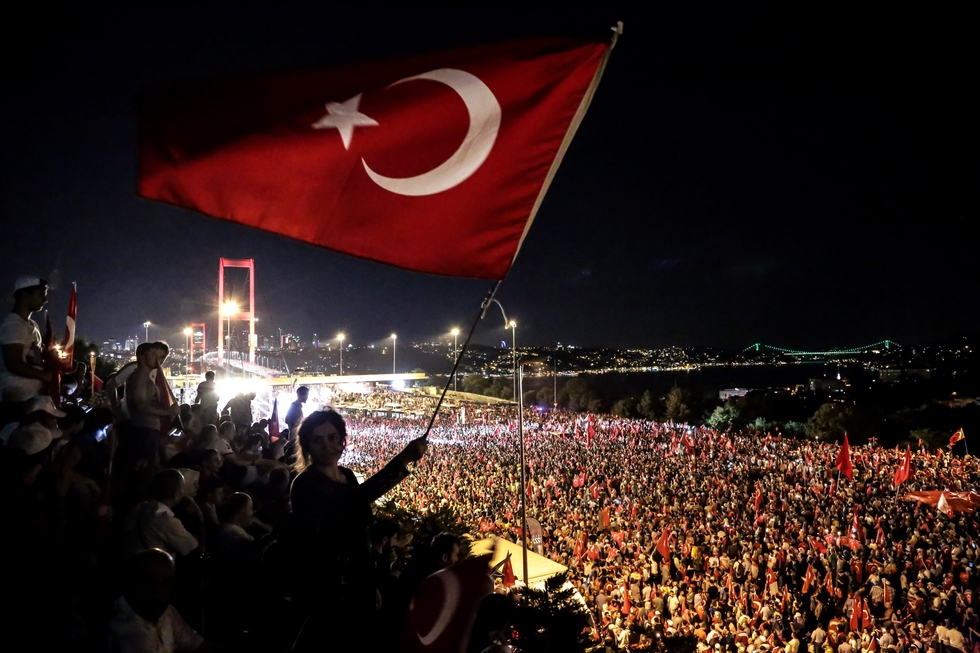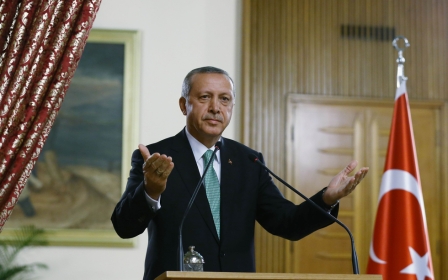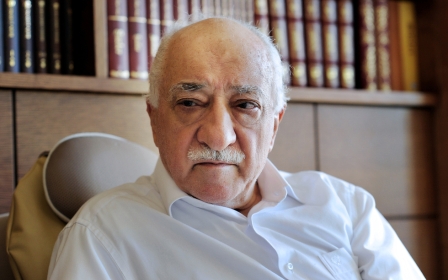Turkey prepares for post-coup unity rally

Turkey is preparing for its first cross-party rally in a show of unity in response to last week's attempted coup, following the break up of Recep Tayyip Erdogan's presidential guard as sweeping purges of suspected state enemies continue.
The mass rally, to be held under tight security at Istanbul's iconic Taksim Square, was called by the biggest opposition group, the secular and centre-left Republican People's Party (CHP).
In a show of patriotic unity, it will be joined by Erdogan's ruling Islamic-conservative AKP party, whose followers have covered city squares in seas of red Turkish crescent flags every night since the failed coup.
CHP officials are estimating a million people will attend tonight's rally, which is aimed at showing a united front against the attempted coup staged by factions within the Turkish military.
The Protests also mark the first time the opposition CHP has been allowed to protest in Taksim square following the Gezi Park protests in 2013.
Sunday's mass event, expected to be boosted by free public transport in the city of 15 million, will seek to soothe divisions after the shock of the 15 July putsch and the subsequent government crackdown.
"The Turkish republic is stronger than it was in the past," wrote Prime Minister Binali Yildirim in an editorial in the HaberTurk daily.
"Turkey is on democracy watch ... This watch continues until the anti-democratic elements are cleaned out," he said.
The number of alleged conspirators who have been rounded up has surged above 13,000, with soldiers, police, justice officials and civilians all targeted in a crackdown that has alarmed European leaders.
Turkey has undergone a seismic shift since the night of violence, when renegade soldiers sought to topple Erdogan but were stopped by crowds of civilians and loyalist soldiers and police in clashes that claimed 270 lives.
In the latest reaction to the coup, Yildirim said Turkey would disband the 2,500-strong Presidential Guard, saying there was "no need" for the elite regiment.
Almost 300 of its officers have been detained after some of them forced TV news presenters to read statements stating that martial law had been declared during the abortive coup attempt.
Under new police powers decreed as part of a three-month state of emergency, all those detained can be held without charge for 30 days.
Also targeted in the sweep was an alleged senior financier for US-based cleric Fethullah Gulen, the reclusive spiritual leader who Turkey accuses of being the mastermind behind the botched attempt to overthrow Erdogan.
Security forces detained the aide, Halis Hanci, in the Black Sea province of Trabzon, a senior official said, describing him as a "right-hand man" to 75-year-old Gulen and responsible for transferring funds for him.
Police also detained Kerime Kurmas, reportedly Turkey's only female fighter pilot, who is accused of being one of the rebel air force officers who flew F-16 jets low over the roofs of Istanbul on the coup night.
Erdogan's government has also sacked tens of thousands of teachers, university lecturers and civil servants and ordered the closure of thousands of schools, associations and charities as it seeks to rid the state of what he has called the Gulenist "virus".
European leaders have protested against the mass purge, with Italy's Prime Minister Matteo Renzi warning that "a country that jails its own university professors and journalists imprisons its future".
Turkey has argued that EU leaders simply do not understand the seriousness of the threat to Turkish democracy.
"Come here and see how serious this is," EU Minister Omer Celik said at a foreign media briefing.
"Those who look at Turkey from far away think it is a Pokemon game," he added, referring to the viral Japanese cartoon smartphone game.
President Erdogan has hit out at leaders from the European Union for its "prejudiced" attitude attitude to Turkey, while 1,200 soldiers detained after the coup bid have now been freed.
Officials confirmed that the 1,200 military personnel freed had been released due to lack of evidence linking them with the coup plot.
The coup and the tough response to it have forced government critics and dissidents to walk a fine line: while the putsch is almost universally condemned, many in Turkey fear being targeted in a retaliatory witch-hunt.
Selahattin Demirtas, co-chair of the pro-Kurdish Peoples' Democratic Party, has warned that heightened police powers and rule by decree "pave the way for more injustice".
The turmoil has also strained Turkey's ties with its NATO allies and cast a shadow over its long-term bid to join the European Union.
Celik insisted Ankara remained committed to joining the bloc and would honour a landmark deal with the EU to stem the flow of migrants to Europe.
But Erdogan struck a darker tone, telling France 24 television on Saturday that "for the past 53 years Europe has been making us wait" and that no EU candidate country "has had to suffer like we have had to suffer".
He rejected the European criticism of his response to the coup attempt, saying that "they are biased, they are prejudiced, and they will continue to act in this prejudiced manner towards Turkey".
CHP leader Kemal Kilicdaroglu, MHP leader Devlet Bahceli and Prime Minister Binali Yildirim will also be visiting President Recep Tayyip Erdogan together tomorrow.
It will be the first time that Kilicdaroglu and Bahceli will be visiting the controversial presidential palace since it was built.
New MEE newsletter: Jerusalem Dispatch
Sign up to get the latest insights and analysis on Israel-Palestine, alongside Turkey Unpacked and other MEE newsletters
Middle East Eye delivers independent and unrivalled coverage and analysis of the Middle East, North Africa and beyond. To learn more about republishing this content and the associated fees, please fill out this form. More about MEE can be found here.




